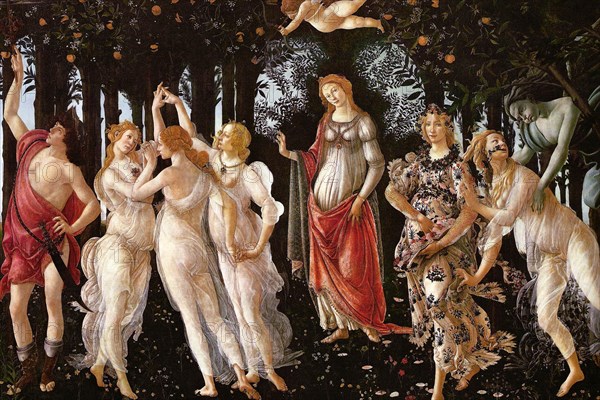
Sujet
Spring - Primavera
Légende
Spring - Primavera; Primavera (which means "first green" in Latin, although there is precious little green in this painting) Botticelli chooses to tell the story of spring as the season of romantic attraction. Imagine that you have a print of this painting on paper and you've connected the left and right edges to form a cylinder with the picture on the outside. The action of the scene flows from right to left with Venus in the center presiding over everything, like a motion picture director over a shot or the conductor of an orchestra over a performance. On the right is the first cameo: the frightened nymph Chloris is pursued by Zephyr, god of winds (that blow in the new season of spring). Zephyr's blue/green coloring presumably represents the element air, but also the chill of winter and so connects the current scene to the one which came before. Zephyr is overcome by attraction to Chloris' beauty. Beside Chloris is the goddess Flora, whom Chloris is soon to be transformed into, according to Ovid; Flora is pregnant and scatters flower petals as symbols of fecundity. Alessandro di Mariano di Vanni Filipepi (c. 1445 – May 17, 1510), known as Sandro Botticelli, was an Italian painter of the Early Renaissance. He belonged to the Florentine School under the patronage of Lorenzo de' Medici, a movement that Giorgio Vasari would characterize less than a hundred years later in his Vita of Botticelli as a "golden age". Botticelli's posthumous reputation suffered until the late 19th century; since then, his work has been seen to represent the linear grace of Early Renaissance painting..
Italy
Date
1477
Crédit
Photo12/Universal Images Group/Buyenlarge
Notre référence
UMG20B30_185
Model release
Non
Property release
Non
Licence
Droits gérés
Format disponible
17,2Mo (1,9Mo) / 25,4cm x 16,9cm / 3000 x 2000 (300dpi)